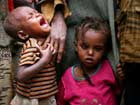| Videos | ? Latest |
|
? Feature | ? Sports | ? Your Videos |
Malnutrition in Ethiopian children

 0 Comment(s)
0 Comment(s) Print
Print E-mail
China.org.cn, August 31, 2011
E-mail
China.org.cn, August 31, 2011
In drought ravaged Ethiopia there is a thin line between life and death. The last decent rains fell here two years ago. Families are watching their animals die and wondering if they will be next.
A mother Berida Jateni said: "The drought has finished off our cattle and the few that remain are dying. We are afraid that it will be people next, unless we get help."
When Berida Jateni's livestock died, so did the main source of food for her children. She said: "My daughter used to drink cow's milk but now we don't have any because the cows died. Even if we could buy milk, there is none available."
Berida's youngest daughter, ten-month-old Firdoze was diagnosed with severe acute malnutrition a few weeks ago. Fortunately, health workers going door to door in the district found the sick child. They encouraged her mother to bring her to the local UNICEF-supported health post.
Baby Firdoze, once dangerously ill, is now eating her therapeutic food and putting on weight. But the Ethiopian government estimates there are hundreds of thousands of children like her who are in dire need.
With UNICEF help more than 16,000 rural health posts have trained workers keeping a constant eye on the most vulnerable.
Kalkidan Mamo, health worker, said: "It has been three years since I started working here. The situation now is very different from before. We had rain then, and the cattle had not died. The cows gave milk and they would feed this to the children. But now that the cows have died, the children are suffering for lack of food. So now we are seeing more children affected, including mothers who are breastfeeding."
Already, thousands of lives have been saved. But with no sign of the drought ending, UNICEF and its partners need further support to help families not only feed their children but also diversify their livelihoods so they are not so vulnerable in the face of disaster.





